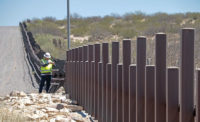A bill authorizing a fence along part of the U.S. border with Mexico has been signed into law and the Dept. of Homeland Security plans to incorporate the barrier into a broader set of physical security measures. But the timetable for designing and building the barrier is not clear.
The Secure Fence Act, which President Bush signed Oct. 26, requires DHS to "provide for at least two layers of reinforced fencing" as well as "additional physical barriers, roads, lighting, cameras and sensors" on five segments, totaling about 700 miles of the 2,000-mile border with Mexico. It requires a fence section in the Laredo, Texas, area to be done by Dec. 31, 2008. But an industry source calls the bill "clearly incomplete." For one thing, it doesn't authorize any funds for the fence.
The DHS fiscal 2007 appropriations bill, signed Oct. 4, does include about $1.2 billion for "integrated security fencing, tactical infrastructure and technology" systems. That includes funds for the project in the Secure Fence Act, a House appropriations aide says. But the appropriations bill also withholds $950 million of the $1.2 billion until Congress approves a DHS spending plan for the fence and other security measures. DHS must send its plan to Congress by early December.
In September, DHS awarded a contract to a team led by Boeing Co. for a combination of barriers, camera systems, sensors, lighting and other border-security technology, says Jarrod Ager, the department's deputy press secretary.
The Boeing contract's initial phase covers a 28-mile border section near Tucson. DHS will evaluate that work after eight months and look at expanding it, Ager says.
"We do feel that fencing does make sense, particularly in urban areas along the southwest border," says Ager. He says the recently appropriated $1.2 billion includes aid for technology and measures other than fences. He adds that DHS will work with Congress on additional appropriations.
Ager says he could not estimate the cost of a 700-mile fence. DHS Secretary Michael Chertoff has said the first two task orders of the Boeing contract, including the 28-mile project, are worth a combined $67 million, but declined to put a figure on the contract's total value.


Post a comment to this article
Report Abusive Comment